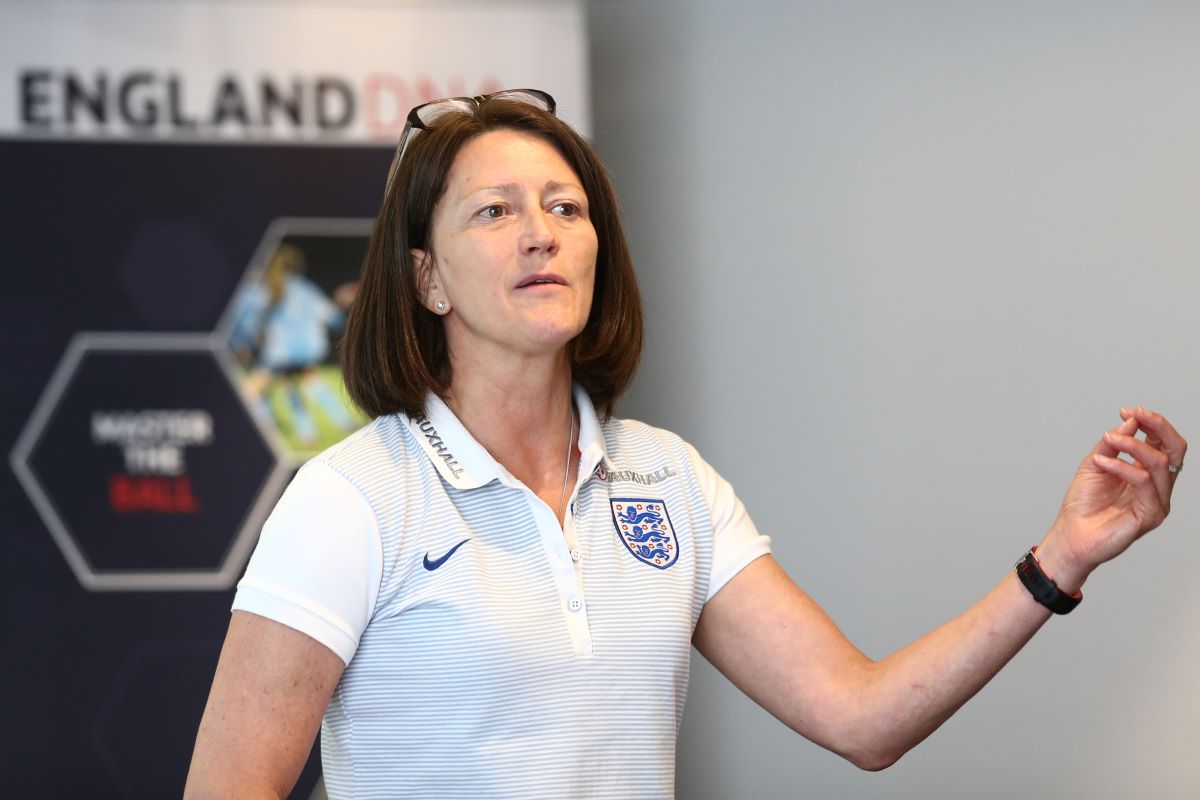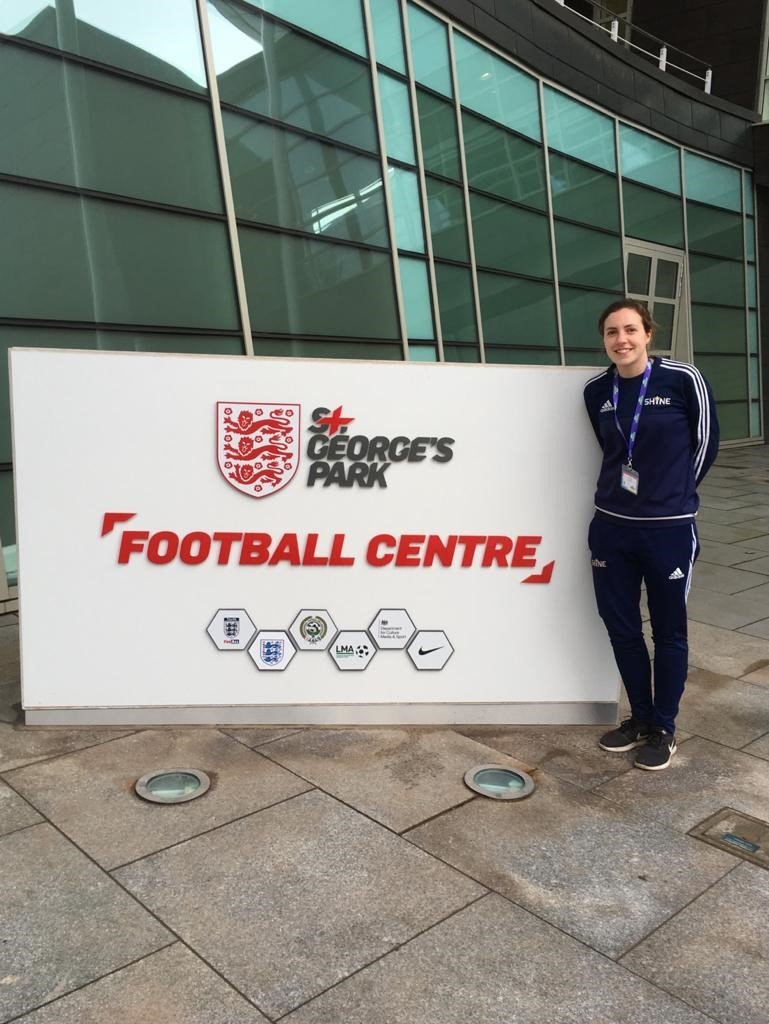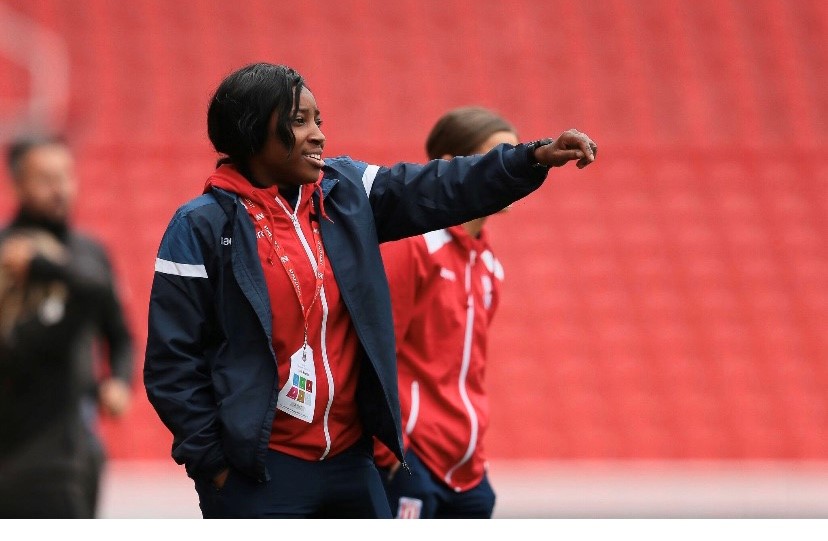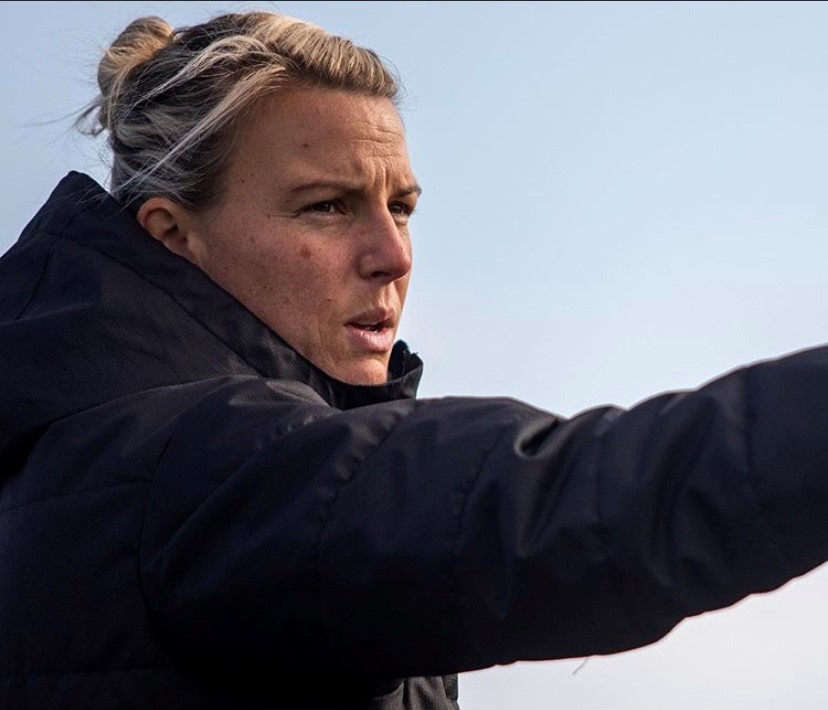
During May and June, The FA will review the impact of The Gameplan for Growth strategy on the women’s and girls’ game.
Launched in March 2017, the strategy pledged to tackle ambitious targets to double participation [by doubling the number of affiliated teams], double the game’s fanbase and create a high-performance system and world-class talent pipeline for England teams to achieve consistent success on the world stage.
After four seasons the strategy is now concluding, and in the coming months The FA will outline its continued support for women’s and girls’ football with the launch of the 2020-2024 strategy.
This week reviews The Gameplan for Growth’s positive impact on the recruitment and development of coaching in the women’s and girls’ game.
THE OBJECTIVE:
The Gameplan for Growth committed to ‘increase the number and diversity of women coaching the sport at all levels’ by developing The FA’s coaching structure.
RESULTS:
• 5,180 new female coaches from 2017 to 2020
• Collaboration with Sport England to support 204 female coaches with bursaries to improve access to UEFA B, A and Pro licence qualifications
• Doubling the number of female coaches holding a UEFA A licence from 41 in 2017 to 82 in 2020
• The introduction of Coach Development Officers to provide one-to-one support – engaging with 2,487 male and female coaches working at grassroots and talent pathway level
• One to one support for 148 male and female coaches at Tiers 1-3 of the women’s game and Regional Talent Clubs [RTCs] via the introduction of Women’s National Coach Developers
• 34,581 coaching qualifications for female coaches from levels 1 to 5 – an 18% increase from 2017
• 333% increase in female head coaches/managers in the Barclays FA WSL and FA Women’s Championship, from three in 2016/17 to 13 in 2019/20
• 67% increase in female head coaches with England’s national teams, from three in 2016/17 to five in 2019/20
Audrey Cooper, The FA’s Head of Women’s Coach Development
“My arrival at The FA from UK Sport in March 2017, coincided with the launch of The Gameplan for Growth and an ambition from my new employers to ‘increase the number and diversity of women coaching in the sport at all levels.
“We recognised improving coaching underpins the strategy’s three big goals to double participation, double the fanbase and to achieve consistent success on the world stage. Better coaching is fundamental to facilitating better player experiences at grassroots and driving higher playing standards in the pro game, thus making it a better, more technical and tactical product to watch.
“The complex challenge put simply was to attract more women into coaching, open the doors for talented female coaches to work at the highest level and provide a better support structure to nurture and develop all coaches [male and female] who were already involved in the women’s and girls’ game. Growing coaching capability beyond qualifications was fundamental.
“I faced similar challenges at UK Sport and Volleyball England but football’s scale and numbers were far greater. Prior to joining The FA, I transitioned from Head Coach of Team GB women’s indoor volleyball team at London 2012, to Technical and Talent Director at Volleyball England and then Coaching Team Lead at UK Sport, where I was responsible for the strategic design, operational planning and delivery of Olympic and Paralympic coach development programmes. A major part of my role was to know what our elite coaches were experiencing and the support they required, whilst also understanding the journey grassroots coaches were on.
“The backdrop to our work at The FA was the rapid growth in the women’s game. In 2017, the top three tiers of the women’s football pyramid looked very different and full-time coaching positions were few and far between. Three years have seen us transition to a professional environment with the introduction of the Barclays FA Women’s Super League and increased standards and opportunities in the FA Women’s Championship and FA Women’s National Leagues. For the leagues and players to thrive we needed to take our coaches on a similar journey of development and increased professionalism, helping coaches consider how they want to coach, manage and lead.
“Our strategic focus was to recruit, retain, develop and deploy more coaches. However, we knew a ‘one size fits all’ approach would not cater for the breadth of coaches across the whole game. The differing needs and demands on a coach at grassroots and at an elite level were considered. Their learning on and off the grass became our core philosophy.
“As a result, we have developed a range of bespoke coach support, tailoring the content and delivery specifically for coaching in the female game. For the first time, really exploring and acknowledging the similarities and differences of the women’s game and how that impacts the skills, attributes and needs of the coaches and players. We have combined this activity with three other core strands; reinforcing the ‘brilliant basics’ of coaching, clear signposting to qualifications, and proactively identifying and nurturing talented coaches.
“A significant early achievement was the creation of the first ever team of female game Coach Developers dedicated to supporting grassroots and talent pathway coaches, ranging from those taking their first steps into coaching to those with full-time career aspirations. Nine Coach Development Officers were employed at each of our nine University based Women’s High Performance Football Centres, providing 2,487 coaches [46% of whom were female] with direct support. Their focus was to provide the coaches with bespoke and meaningful development opportunities specifically for the women’s and girls’ game, catering for the needs of the female player. Being based within the Higher Education environment also provided the opportunity to recruit, develop and deploy coaches from the student population as well as the local football community.
“To compliment and provide additional support to the work of our Coach Developer Officers, we integrated The FA Coach Mentor Programme, providing free-to-access support for female and BAME coaches in a range of areas including one-to-one, individual learning and matchday observation.
“The introduction of four new Women’s National Coach Developers in January 2019 was specifically to support coaches at Tiers 1 to 3 [Barclays FA WSL, FA Women’s Championship and FA Women’s National Leagues] and Regional Talent Club [RTC] technical directors. Their introduction has enabled 83 clubs and over 150 coaches [48% of whom were female] to receive both on course qualification support and off course preparation for the professional game environment. They have challenged the coaches to think differently about their coaching practice and how they work with a multi-disciplinary team, enhancing the quality of their environment, encouraging greater review and self-reflection, and ultimately improving and positively impacting player performance.
“From The FA’s Level 1 through to the UEFA Pro Licence, coaching qualifications are crucial but there was a clear need for greater sign-posting and better support for coaches to be ‘ready’ for the qualification process. Similarly, we recognised the need to improve the learning experience – on and off the grass – with the needs of female coaches in mind. The result was more qualified women and
better experiences. Since the beginning of 2017, over 5,000 more females are now qualified, with over 4,600 beginning their coaching journey with their FA Level 1 and five more UEFA Pro Licensed female coaches in the senior game.
“Qualifications are not only a time commitment but also a financial commitment and the introduction of The FA Grassroots Coaching Bursary, in collaboration with Sport England, allowed 204 female coaches to receive financial assistance to complete their UEFA A, B and Pro qualifications.
“Providing support from within and beyond football to our England Senior and Development team coaches is crucial to our goal of ‘consistent success on the world stage’. Three female coaches were supported through their UEFA Pro Licence and six female coaches benefitted from UK Coaching’s Women Into High Performance programme. FA field trips to the FIFA Women’s World Cup in France
and the UEFA Women’s EURO in Holland were not only important learning opportunities for 14 Development team coaches – experiencing first hand high performance football, pressure environments and different coaching styles – but also a great opportunity to cultivate relationships and reinforce the importance for peer sharing and learning.
“In a joint FA and PFA initiative, three talented BAME coaches – Alena Moulton, Nicole Farley, Coreen Brown – were invited to observe and support our England development teams for one season as part of their journey on the regional talent pathway, providing them with vital learning experiences in a performance environment. We also supported their enrolment onto the UK Coaching Into High Performance programme.
“As the strategy concludes, our journey to increase the diversity and number of female coaches and to normalise women in football coaching continues, across all levels of the game. Within the 2020-2024 strategy you will see coaching play a prominent role in driving higher player standards across the game. Details will be revealed on a renewed focus on supporting coaches operating in the talent
player pathway, a bespoke coaching and leadership initiative for elite level coaches and increased opportunities for BAME coaches.
“Over the last four seasons I have been continuously inspired and energised by individual and collective interactions with coaches operating at all levels. Their unwavering enthusiasm and dedication, desire to develop themselves and their players, and their togetherness to enhance peer to peer learning has been incredible. The greatest joy for me is that there’s a real community spirit
building, where coaches are on this journey collectively, not as individuals.
“We owe a big thank you to the Women’s National Coach Developers and Coach Development Officers for their passion and efforts and for the connections they have built. The individual is at the heart of everything they do. They are the backbone of this strategy’s success and the heartbeat of our future. Coaching in the women’s and girls’ game is a community in every sense of the word and I am so proud to be a part of it.’
CASE STUDIES:
LOTTIE WEEKS – Gloucestershire FA Coach and participant in The FA’s Women’s High Performance
Football Centre [WHPFC] Mentee Programme

“The biggest support I’ve had since I started my coaching career has been from the Gloucestershire FA and more specifically from Abbie Sadler [WHPFC Coach Development Officer] who I have been working with through The FA’s WHPFC Mentee Programme. With the help of the Gloucestershire FA and my work place Shine, I have been given so many more opportunities since moving to Bristol than I would have had previously.
“Since I’ve started on my coaching career journey, the opportunities for female coaches entering at a grassroots level have improved significantly. The FA Wildcats programme has been a great starting point for female coaches. Wildcats is a participation programme, which offers 5-to-11-year olds an opportunity to experience football for the first time. It has allowed female coaches to flourish in an
environment that they feel comfortable coaching in. I have seen first-hand how the girls only sessions have really improved the confidence and given many female coaches the push-start that they need to follow their passion of coaching.
“As part of my coaching journey, I was doing my Level 2 coaching badge and was in frequent contact with the Gloucestershire FA. My contact there introduced me to the Gloucestershire FA Girls’ Development Centre and subsequently The FA’s WHPFC and this resulted in Abbie becoming my mentor. It wasn’t something I had previously considered; however Abbie has been great in encouraging me to join various coaching workshops and the one-to-one support she has provided has been extremely helpful with my development. Because of Abbie’s support, I’ve managed to create a lot of fantastic networking opportunities to share ideas and meet others on the same journey.
“Since working with Abbie, I have been attending The FA Girls’ Advanced Coaching Centres [ACC] which are designed to support the development and progression of players in the South West and East of England. Coaching at The FA’s ACC has given me experience of working with different age groups, which will be key in my progression as a grassroots coach. It has also allowed me to work with Abbie to review the sessions I have held, evaluate the way I plan and discuss ideas with other coaches who are in a similar position.
“When I was at school I was the only girl that played football, so I never imagined I could have a career in the game, let alone as a female coach. Seeing the doors that have been opened and working with The FA Coaching Team has drastically changed my attitude on what I can achieve in my career. Looking up to the female coaches who are managing teams in the Barclays FA WSL or The FA Women’s Championship makes me realise this is a career I can choose professionally. The change in attitude is a breath of fresh air.”
ALENA MOULTON – Assistant Coach at Stoke City Women

“As a coach it’s often difficult to establish your character, your vision and develop what you stand for. Over the last four years and since working with FA Women’s National Coach Developer Amy Price in the last 12 months, I’ve matured, developed and learnt what I’m best at and what I want my vision to be as a coach.
“A big moment in my journey was when I was invited onto the Into High Performance Coaching programme by UK Coaching. The three-day course brought together coaches from a variety of different sports and gave us the opportunity to engage and interact with male and female coaches, not just in football. I certainly benefited from this and a couple of months later I was able to apply my learnings at Stoke City Women and positively impact the players.
“In 2016/17, I completed The FA’s Elite Mentee programme which led to a role as Technical Director at Nottingham Forest Women. For me, it’s important to ensure more coaching opportunities are given to female BAME coaches. In my journey, I was fortunate to have a coach and a group of players who understood me. It’s important to have role models and for me, Hope Powell was someone to look up to. Hope represents not only female coaches at the top level, but also those from a BAME background.
“I’ve been lucky enough to have several mentors along my coaching journey and it’s extremely important to have someone close to you that has similar values and will guide you in the right direction. I started with Amy in April last year and since then, she has helped me through the difficult and long journey to achieve my qualifications and made me think about elements of my coaching that I didn’t appreciate beforehand. This different way of thinking allowed me to be more in depth about how I plan my sessions as well as introducing me to new technology to help with my career. As someone who also mentors others, I aim to help provide guidance as I know how important it can be.
“After working with Amy and Chloe Jones [Head Coach at Stoke City Women], I now see mentors differently compared to twelve months ago. I consider them as more of a critical friend and someone I can go to for support, guidance and advice in difficult times. I’ve realised that, as a coach, it’s so important to have that back up. I’ve been extremely lucky to have the help of my mentors, friends and family to support me in overcoming many physical and mental barriers to get to where I am now.”
TANYA OXTOBY – Manager of Bristol City Women

“My journey to becoming a manager in the Barclays FA WSL has been a long process across two countries, England and Australia. After a lot of back and forth and many coaching roles, I became Assistant Coach at Birmingham Ladies in 2016 where I stayed for two years before joining Bristol City Women as Manager in 2018.
“Over the last few years, the opportunities for female coaches have massively changed. The visibility of the Barclays FA WSL and FA Women’s Championship has grown and what’s pleasing is the amount of formal and informal development opportunities that have opened up for female coaches.
“In my opinion, the biggest change in the last four years comes in three ways;
• Formal development – the improvement, access and frequency of coaching courses
• Informal development – the growing network between female coaches
• Experience – female coaches are now given the opportunity to put those formal and informal practices into play
“Whilst travelling back and forth from Australia, I felt as though I was in no man’s land and not sure of where I could go to progress my career. I hadn’t built any networks in England but that changed when I met Audrey Cooper [The FA’s Head of Women’s Coach Development] through the Women’s High Performance Football Centre. My network of female coaches in the UK grew, I had access to
coaching courses and finally I was being given the opportunities to put my learnings into practice. Without the support of The FA, this wouldn’t have been possible.
“The FA’s Women’s National Coach Developer Amy Price has been vital to my progression over the last twelve months. It’s not been the easiest of seasons, however she has grown to understand me as a person and know what my values are as a coach. Instead of being there to critique me, she will always offer support, constructive feedback and work with me to continuously improve. Often, she will watch an interview I have done or attend a game and will take time to chat with me after on what she notices and the kind of things I might consider for next time. After a defeat, she’ll turn up at the Bristol City training ground and she will listen to my thoughts and how I’m feeling; it’s not always something I think I need but it’s a weight lifted off my shoulders after.
“In Australia I had received my AFC A licence, however when moving to England, I was told I would have to get my UEFA A licence as the legislation was different. Without The FA’s support and guidance I truly believe I would have fallen through the cracks and been at a bit of a dead-end. I’m truly grateful for their support and backing.
“An FA organised trip to the Women’s World Cup in 2019 was one of the highlights of my career so far. To have The FA take the time to organise and fund the trip and knowing they are investing in you as a person and a coach, made me feel a million dollars. Being able to go and watch the best teams and coaches in the world and being in a room with like-minded people was priceless. The opportunity to dissect and discuss what we had seen from a technical and tactical point of view, looking at body language and the role that coaches have as mentors was big development moment for me. I still keep in contact with people from the trip now, and when you’re having a tough time they do pick up the phone and check in on you. That trip helped me build that support network.
“As a Barclays FA WSL manager there is a lot of pressure and responsibility within the role, however I am so lucky to be doing something I absolutely love, and knowing I have the backing and support of The FA and other female coaches around me is definitely something that keeps me motivated. I can’t wait for the women’s game to grow even more and help other female coaches to come through the coaching pathway. Football is ever-changing so who knows what the next twelve months will have in store.”
Lisa Fallon and Melissa Phillips announced as new London City Lionesses coaching team




